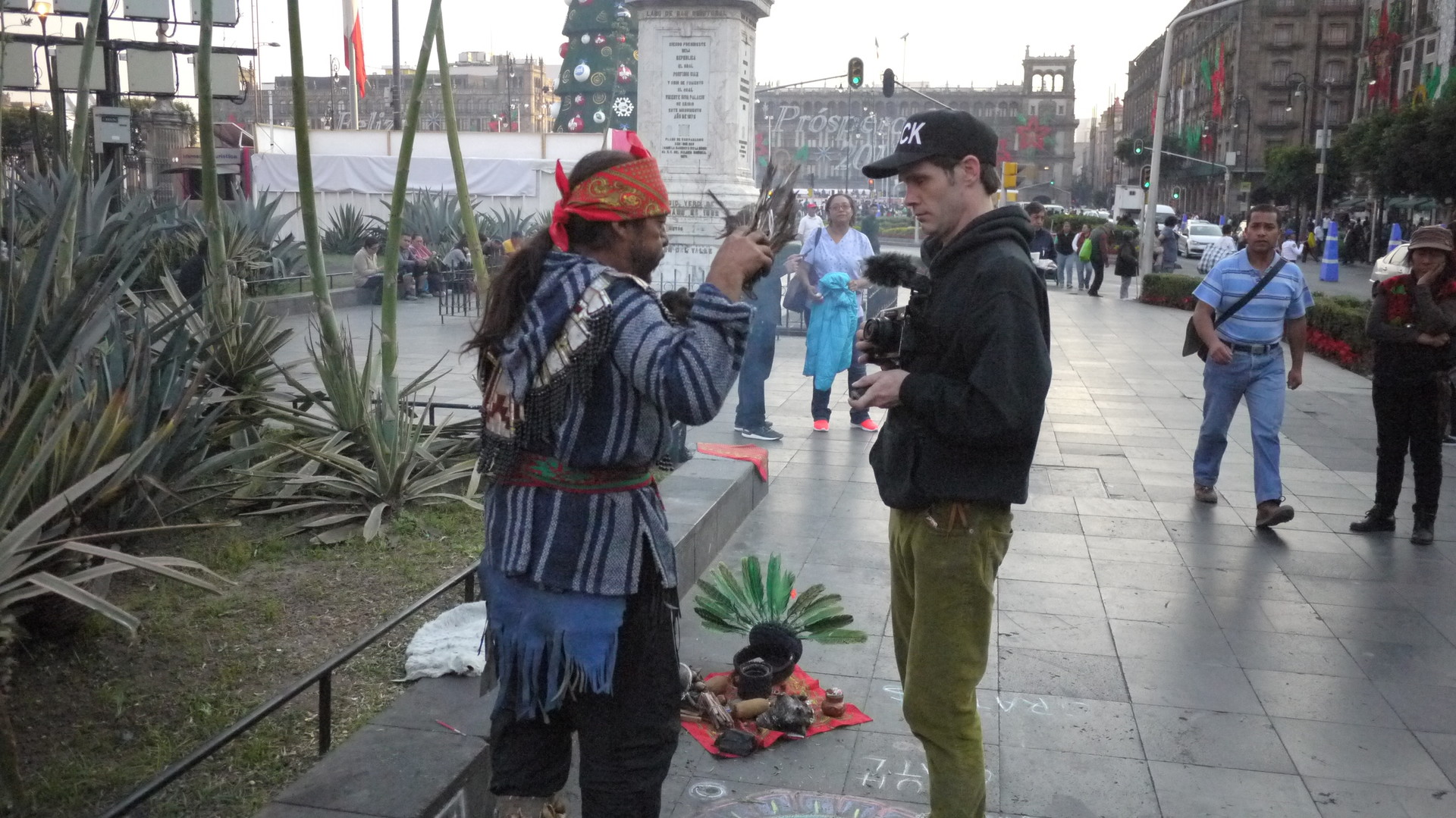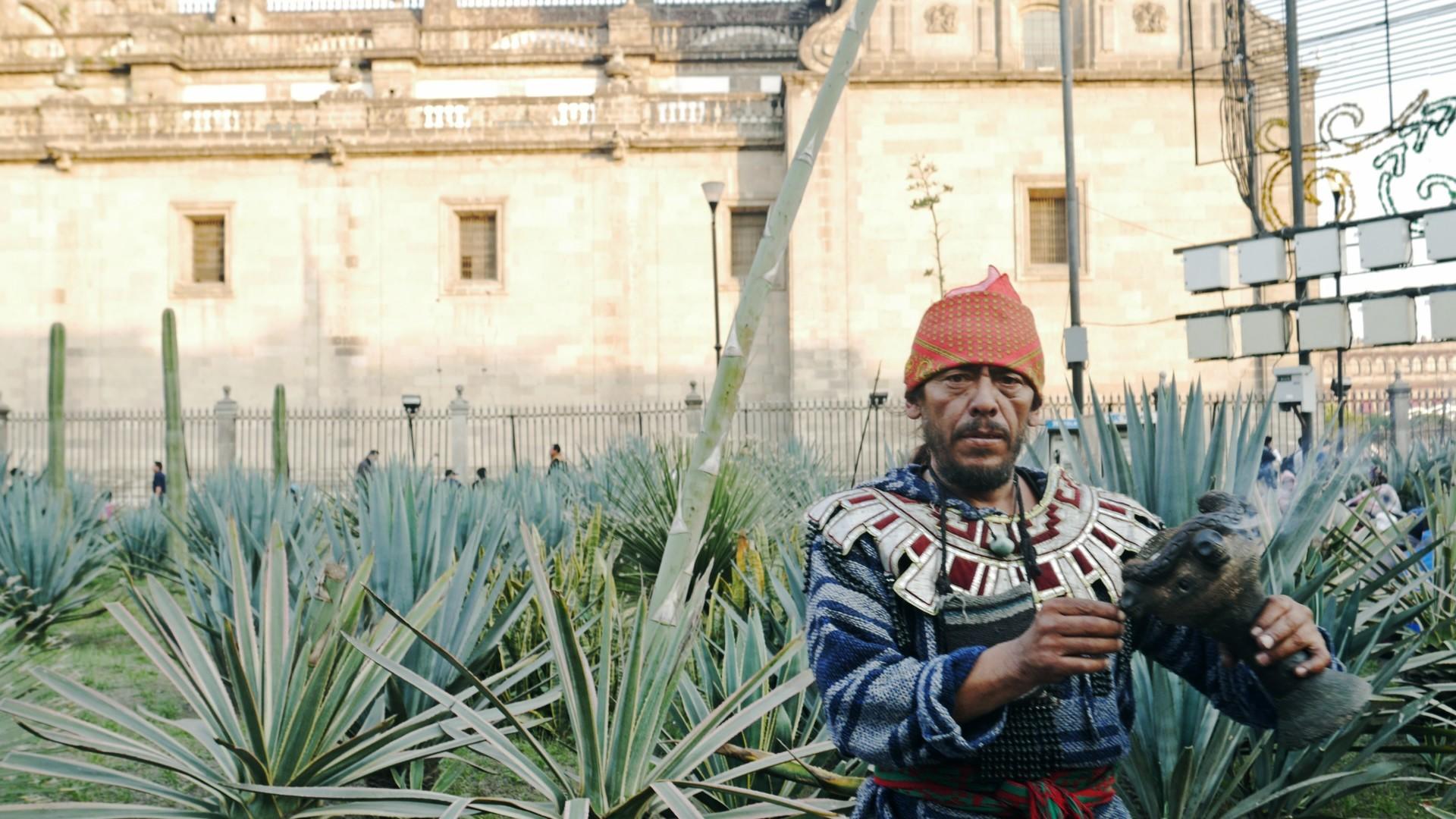Sidewalk Entrepreneurs is one of more than 90 films screening at this year’s Seattle Latino Film Festival, which takes place at eight venues across the city — including Sea Mar’s yet to be unveiled Museum of Chicano/a/Latino/a Culture. Among the shorts, documentaries and features are La Camarista (The Chambermaid) and El Ombligo de Guie’dani (Guie’dani’s Navel), two films that explore the role of Mexican domestic workers from a different perspective than the one presented in Alfonso Cuarón’s 2018 award-winning Roma. Other films look at the Mexican religion that follows la Santa Muerte (Holy Death), parents who struggle when their son requests a gay Mexican love song and the experience of two Central American migrants in Mexico City waiting for U.S. asylum.
But Elliott’s short documentary is the only view of Mexico presented from a skateboarder’s perspective.
The 45-minute film opens with a view of the largest city in North America bustling awake. Commuters crowd intersections on foot, in cars and on skateboards. Elliott, who narrates, sets the focus:
“Millions of people are on their way to work right now … and hundreds of thousands of them actually work right here on the sidewalk,” he says. “They’re part of the untaxed labor force … which represents 58 percent of the jobs in the city.”
A few local skateboarders guide Elliott to some of Mexico City’s scrappiest and most innovative vendors. In one scene, the operator of a small sidewalk popup store selling zines explains why the independent press matters. In another, two tango dancers dressed in formal tango gear perform on a crosswalk for drivers stopped at a red light, then walk up to the windows with their hats to collect tips. In yet another moment, a city-sanctioned Aztec shaman heals a couple of skaters in a bath of incense smoke.
Elliott, 41, has been making films for the past 12 years, but mostly as personal projects. Based in Seattle, he produces freelance videos for his company, Rock Paper Scissor Media, and volunteers as a videographer for Unknown Board Shop, a skate shop in Bellingham.
Crosscut interviewed Elliott about his filming experiences, his connection to Mexico City, and why the best way to get to know a city is to meet its skateboarders.
This interview has been condensed and edited.
How is this film different from your previous work?
Typically, when I get done with a piece, it’s just for me. This is the first time I’ve taken a piece and really tried to polish it to a level it can be screened in a theater. I wasn’t sure I could get it to a level that really resonated with people and keep that balance of watching it calmly and absorb the information and not get bored.
What is your connection with Mexico City?
I have some family and friends who live in the city. I started traveling down to Mexico City in 2008 or 2009 and just fell in love with the city. I lived there for about six months in 2010. On my fourth trip there, I went to the dentist and got some work done and I ended up marrying my dentist. Now she lives here with me in Seattle.
Where did you get the idea for Sidewalk Entrepreneurs?
When I go to [Mexico] city I’m dealing with street merchants quite a lot. I started to notice that absolutely everybody was using these illegal businesses, even the police. So the very people paid to stop them not only don't stop them, but use their resources, just like everybody else. That got me thinking about why it works like that.
Where in Mexico City did you film?
I went all over, from the north side and south side, east side, and west side. I didn’t hang out in one safe delegation to do my work. I went to the super dangerous places, I went to the super nice places. I went everywhere.
Which places ended up in the film?
While we filmed in almost all the districts, the districts we filmed the most in were Benito Juarez and Cuauhtémoc.
I chose Benito Juarez because it is a busy business hub with a lot of working professionals. What makes it unique is it’s connected to Iztapalapa, one of the poorest districts, People commute [from Iztapalapa] to Benito Juarez and make the sidewalks of that district their storefront. I was amazed how well this actually works, as people from both delegations seem to have positive attitudes towards the relationship.
I didn’t really choose Cuauhtémoc. A few crew members told me I have to cover this area. As soon as we started shooting I understood why. This is where most of the government institutional buildings are. It’s where the largest number of street workers are working. This is a huge business hub for everyone, from government officials to [sex workers] and counterfeiters.
Who is the intended audience for this film?
The intended audience is an English-speaking audience simply because I figure they can get the most out of it. The people living in Mexico have a general idea of street merchants and what life is like there. I wanted to show a different side of Mexico City that shows what it's like on the streets, but paints it with a different brush. It often gets painted [as] being the murder capital of the world. [Ed note: It’s not the murder capital of the world.]
How do you achieve an authentic perspective?
It’s got an organic feel, it’s not jarring, but it’s not a Hollywood production. It’s not exactly a home video, but it kind of has elements of all those without taking them to the extreme. So it feels real to [the viewer].
What can people learn about Mexican culture from this film?
These are self-starting people who have highly developed skills and are very talented artists and scientists and musicians. I started at the very street level, and you can see all those qualities exist there. I hope that [viewers will] understand that’s their whole social system — it's not broken. People think the best you can do in Mexico is to escape Mexico and come to the U.S. — which is ridiculous.
I feel so often the only [Mexican] people represented, whether in documentary or narrative pieces, are narcos and beautiful yet not intelligent women. I think they have a lot more to offer and have proven it many times. I have high hopes [viewers] can relate to at least one or two of the characters.
Did you have a special connection with anyone in your film?
The character in the film I know best is Alan “Mosco” Lopez [a skater who sells homemade grip cleaner to other skaters]. I’ve known him for a long time, and I admired his work ethic and how he is so willing to share and feel a sense of community. But my favorite character in the whole piece is the shaman. He was hitting so many great chords with me. It wasn't until my wife and I sat down and did the subtitling that I really was like, “Wow. I could have just filmed this and I’d be happy with this.”

In the documentary you mention this form of street vending is part of the country’s identity. What kind of culture does street vending cultivate?
This is human connection at its most basic. It’s not only public commerce, it’s your neighbor. I think what that fosters is an opportunity for community. You'll notice when people are around the street, unless they're in a hurry, they'll kind of just hang out. That's something you won't see when people buy things at Office Depot or Walmart. I think these people really value those connections.
Did you expect to get Sidewalk Entrepreneurs into film festivals?
I couldn't gauge how much interest I would have because I haven't really watched too many documentaries like this that put a positive light on Mexico and commerce. I had my sights on the Latino Film Festival, but I thought that was just too big of a venue for something that was as raw and organically street-produced as we made. I’m very proud, but I mean I can't try and say its Hollywood quality. I'm not disillusioned, you know. It's not a Scorsese piece.
You did a previous film about skateboarders in Mongolia. What is it about skate culture that pulls you in?
It's my comfort zone. The thing that makes skate culture skate culture is that it doesn't really differ from place to place. That subculture not only has a lot of elements that overlap culture to culture, they're for the most part very welcoming to other people who aren't from their community. They see it — especially people who don't get to travel — as a chance to travel. People who've never been far from Mexico City are the ones who really want to take you home so their mom can make dinner for you and get to know the family.
Without them, not only would this film not exist, half of my films would not exist — even the ones [that] have nothing to do with skateboarding. I’m an introvert who does not deal well with meeting new people and building relationships, but inside the skate community I can feel comfortable and express myself in ways I wouldn't be comfortable doing with people in the film industry.
Correction: An earlier version of this story misspelled the director's last name.


